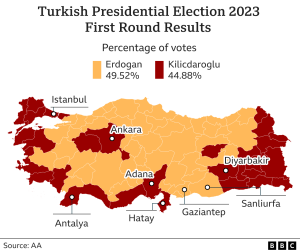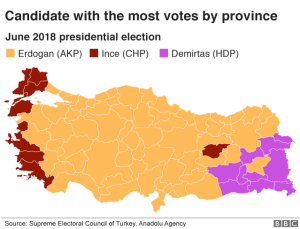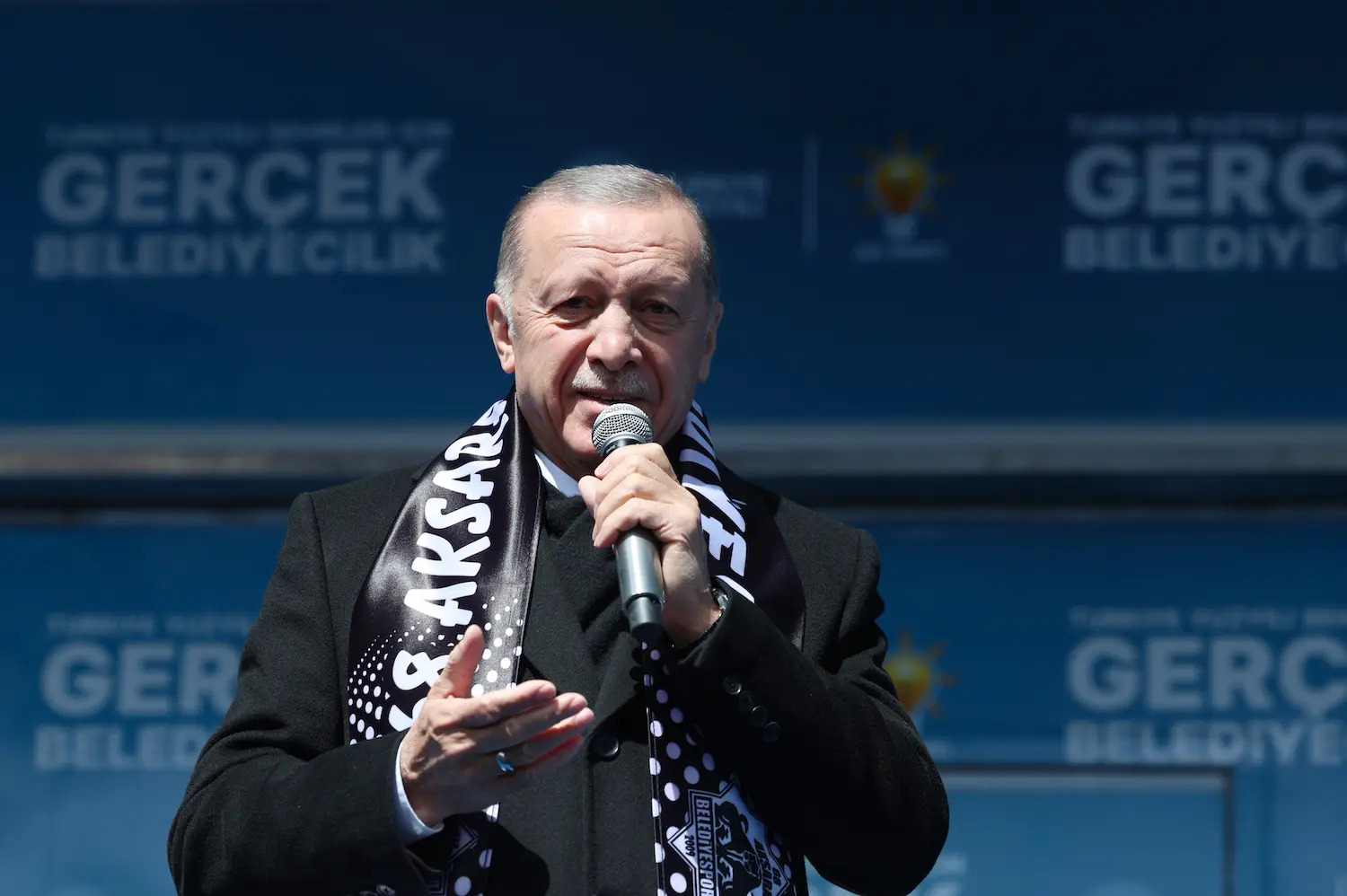The Turkish President, Recep Tayyip Erdogan, addressed citizens at a rally of his Justice and Development Party (AKP) on March 26 in the central Anatolian town of Aksaray, deep in the AKP’s electoral heartland.
In a speech that sought to primarily address issues of pressing domestic concern and fuel the AKP’s electoral base for the coming local elections to be held across the country on March 31, Erdogan’s address was also partially defined by an external outlook that touched upon foreign affairs, the state of conflict from the Balkans to the Middle East, and most notably Turkey’s position in increasingly tumultuous global and regional environments.
Having addressed Turkey’s cost of living crisis caused by rising inflation, facilitated largely by the President’s own unorthodox approach to resisting interest rate hikes, Erdogan looked abroad for unnamed foes and adversaries seeking to “instill insecurity and instability in Türkiye”.
Strategic Insecurity and the “Sevres Syndrome”:
The President’s speech was at times defined by an almost conspiratorial tone and the ruling Turkish elite’s age-old internalised insecurity over external real and imagined foes that aspire to chip away at Turkish power, sovereignty, and territorial integrity. The so-called “Sevres Syndrome” describes the nationalist and institutionally ingrained strategic insecurity, stemming from the late Ottoman Empire’s partition in the early 20th century by the Allies through the 1920 Treaty of Sevres, which often shapes official Turkish rhetoric, perceptions of neighbouring and offshore adversaries, and foreign policy-making.
The “Syndrome” is particularly strong in some of the President’s statements that describe a country encircled by conflict and instability “from the Balkans to the Caucasus”, facing unnamed foreign enemies that attempt to drag Turkey into a whirlwind of global insecurity and back “into this catastrophic scenario with the countless attacks [that] we have been subjected to in the last 10 years”.
While at first, it remains unclear as to what or whom Erdogan is alluding to here, the reference to “countless attacks” is likely framing the actions of the PKK, the Kurdish militant group labelled as a terrorist organisation by Turkey, the EU, and the US.
Indeed, at another point, the President exalted Turkish military action against “bloody terrorist groups” and highlighted that the Turkish state now exerts full control over the areas of Gabar, Tendurek, and Bestler-Dereler in the country’s south-east region bordering northern Iraq and Syria.
“We cleared the terrorists and now we’re extracting thousands and tens of thousands of barrels of oil every day (from Gabar)”, he added, referring to the discovery of oil reserves in Sirnak province’s Mount Gabar where Canadian company, Trillion Energy, is now operating in 10 oil fields.
In this context, a subsequent statement at a rally in the city of Batman earlier today highlighted that the country is ‘gradually taking control beyond its borders’, taking the fight against Kurdish militants once again in northern Iraq and Syria.
The weaponisation of the “Sevres Syndrome” around election time has proved a favourite strategy for Erdogan for consolidating the electorate and securitising the electoral struggle across and between the identity politics of the Islamist ultranationalist government and the Kemalist-dominated opposition.
The Road to March 31:
The President is desperate to make the case that in a regional and international system where insecurity and conflict are rife, the Erdogan government has maintained relative domestic stability and has strived to shield the nation and citizens from external and domestic threats to their livelihood and welfare.
Concerning the economic aspect of the AKP narrative, the concrete reality of financial hardships and deteriorating standards of living for the vast majority of the country’s working class is overwhelming. Neverthless, the AKP’s winning coalition of the past two general elections is founded upon the continuing electoral support of the Central Anatolian heartland and its electorate, comparatively lower socio-economic class to voters of the peripheral region.
The President’s relationship with that demographic is defined by a stark convergence over identity politics that has evidently taken precedence in the past election cycles over rational choice considerations, concerning the worsening state of the Turkish economy, that may have compelled them to vote for the Kemalist alternative. The vast majority of the AKP’s core electoral base values the government’s religious and social conservatism and the political continuity in the past 21 years of AKP rule.
From the Nationalist Movement Party’s (MHP) Panturkic fascism to the Republican Party’s (CHP) Kemalist ethnonationalism, or even the small Vatan Party’s Eurasianism, Erdogan’s AKP stands out for its resilient and lasting synthesis of Turkish nationalism and Sunni Islamism that had been years in the making before its rise to power in 2002.

Courtesy of BBC

The fragmented Kemalist-dominated opposition stands at a critical crossroads in the upcoming March 31 election of denying the AKP control of major Turkish metropoles as in 2019 or failing to deal a considerable electoral blow to Erdogan’s hegemony and veering further into irrelevance.
The Kurdish vote in the southeastern regions and major contested cities, such as Istanbul, will play a decisive role come election time.
The Turkish President’s latest visits to the southeastern Kurdish-majority city of Diyarbakir sent a clear message to the Kurdish electorate:
“Please let all my Kurdish brothers answer this question by putting their hands on their conscience. Didn’t Diyarbakir see peace, freedom, investment, service and prosperity during the AK Party period?”
“While they were doing blood politics […] didn’t we struggle to keep our children alive and connect them to life with education, health and employment?”
The bargain is harder to sell for Erdogan in a region devastated by the February 2023 earthquakes, suffering enormously due to poor infrastructure and preventive provisions, undercut by years of AKP corruption and clientelism.
The Kurds of Diyarbakir aren’t too forgetful either when it comes to the last local election in 2019. Following the victory of the Kurdish Peoples’ Equality and Democracy Party (DEM Party) in the southeast, the Erdogan government removed the elected DEM mayors of Diyarbakir for alleged ties to the PKK and replaced them with AKP-approved officials.
Predictably, Erdogan’s stunt backfired in the 2023 general elections and the President’s rallies in south-eastern Anatolia seek to mend ties with the Kurdish minority which he remembers “from election to election”.
Whatever the results of the March 31 local elections are, they will constitute a litmus test of Erdogan’s continuing unrivalled hegemony in Turkey and the opposition’s faltering coalition-making. While denying victory for the AKP at the local and mayoral level in the southeast or Istanbul might not mean much in 4 years time until the next general election, it will be a pivotal moment for the near-future of Turkey’s domestic power dynamics.

